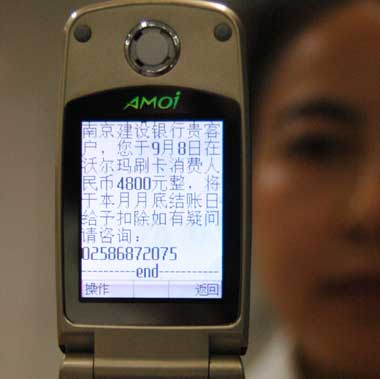|
Beijingers fall victim to SMS scam
By Cao Desheng (China Daily)
Updated: 2005-10-12 05:44
A Beijing resident surnamed Wang never thought a text message on his mobile
phone would cost him more than 150,000 yuan (US$18,500).
Last week, Wang was stunned by a message that claimed he had bought items
with his credit card that totalled more than 18,000 yuan (US$2,200). He said he
had not used the card.

A bank clerk shows
the content of a text message scam in Haian, Jiangsu Province September
30, 2005. [newsphoto] | Anxious, he dialled the number that the message left to contact the bank
staff, and he was asked on the telephone to leave his card number and password
for further identification. Later Wang found the spending limit on his account
had been reached. When he redialled the contact number, there was no response.
Wang's case turned out to be high-tech fraud, and he is only one of many who
were cheated through a short message service (SMS) via mobile phone.
The Beijing branch of China Unionpay, a national bankcard information
exchange network, reported it had received thousands of inquiries from worried
credit card holders about their accounts during the just-ended National Day
"golden week."
China has more than 370 million mobile phone users, and hundreds of millions
of short, or text, messages are sent every day, making it a profitable
value-added service.
But mobile phone subscribers are frequently inundated with unsolicited SMS
transmissions, from lewdness and sexual services real or virtual to cheap
airline ticket ads and other marketing ploys.
There is no official data on the extent of the problem, but many mobile phone
users in China have complained of receiving suggestive short-message spam,
pornography and other illegal content.
"Legally, the sending of short messages containing text or pictures with
pornographic content or false content, violates regulations, pollutes society
and spreads a very bad influence," an expert from the Ministry of Information
Industry said. The telecom industry regulator needs to expand its oversight of
telecom operators and service providers, said the expert from the Telecom
Institute under the ministry who gave only his surname, Lu.
The ministry has already launched a campaign to check telecom operators and
service providers this month.
(China Daily 10/12/2005 page2)
|